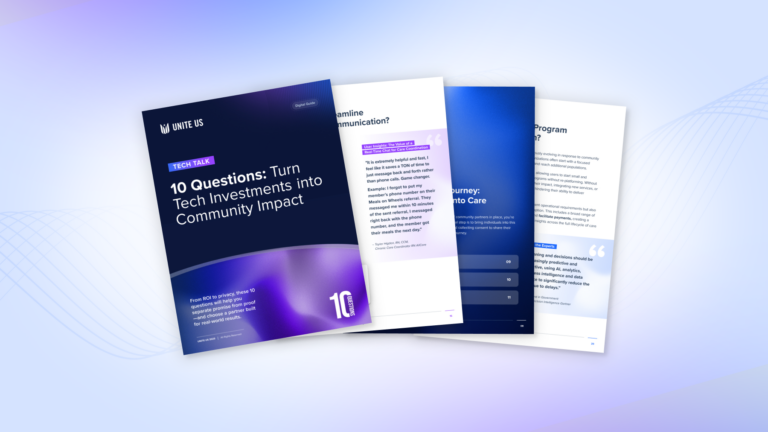
Community Voices on Medicaid Reimbursement: Challenges, Innovations, and Insights
By: Audrey Lopez, Senior Manager, Government Marketing
Strategies for community-based organizations (CBOs) to navigate Medicaid transformation and strengthen community impact.
Watch the full webinar now
As the healthcare landscape evolves, CBOs continue to play a critical role in providing access to critical wraparound services for vulnerable populations.
States are increasingly using Medicaid waivers to support members’ health-related social needs (HRSNs), or non-medical needs, by streamlining social care reimbursements to CBOs. This presents both opportunities and challenges for CBOs, as they continue to provide these services in their communities while developing the systems and expertise needed to bill Medicaid successfully.
That’s why Unite Us, in collaboration with Intrepid Ascent, hosted our recent webinar, “Navigating Medicaid Transformation: Lessons Learned for CBOs.” This session offered invaluable insights into how CBOs can effectively navigate the complexities of Medicaid transformation, strengthen their role in the community, and enhance their ability to address social care needs.
A Changing Landscape: Why CBOs Matter More Than Ever
Medicaid reform isn’t just about changes in reimbursement rates or policies; it’s about a fundamental shift in how healthcare and social services are integrated. CBOs, as trusted community partners, have a pivotal role to play in this transformation. They ensure that vulnerable populations continue to have access to essential services, including food, housing, transportation, and mental health care.
As Medicaid continues to evolve and social care becomes a larger part of healthcare delivery, CBOs must adapt to stay relevant. This webinar, which brought together experts from various community organizations, explored how CBOs can not only adjust to these changes but actively lead the way in their communities.
Here’s a recap of the key takeaways from this can’t-miss discussion.
Key Webinar Insights
1. The Role of Trust and Shared Leadership in Program Success
Brandon Wilson, COO of Asheville Buncombe Community Christian Ministry (North Carolina), said it best: “Collaboration happens at the speed of trust.”
Given the immense complexity of Medicaid waivers and the number of stakeholders required to actively participate in Medicaid reimbursement, fostering strong partnerships is imperative for successful implementation. When government agencies, CBOs, and health plans work collaboratively from the start, programs have a much stronger likelihood of demonstrating ROI—a critical element of long-term sustainability.
The webinar discussed strategies for building strong partnerships, such as:
- Leveraging shared resources: Aligning objectives and sharing resources, including data and funding, to create a seamless network of care.
- Building trust: Establishing strong, transparent relationships with healthcare partners and ensuring mutual understanding of each organization’s role in the process.
- Staying at the table: Advocating for the role of CBOs in decision-making processes as Medicaid reforms are implemented.
Rachelle Simon, Executive Director of the United Way of Pettis County (Missouri), also touched on the importance of partnerships and collaboration in rural spaces, saying: “In spaces where there’s a lack of resources, your imagination can get smaller… let’s think about it, let’s get that imagination going, let’s understand.”
2. Streamlining the Reimbursement Process Drives Scalability
One of the most complex aspects of Medicaid transformation is navigating the reimbursement landscape for social care services. CBOs must understand the emerging opportunities and challenges of getting reimbursed for non-medical services, such as housing support or food security initiatives.
The session provided clarity on:
- New billing codes: How to use new billing codes under Medicaid to get reimbursed for social care services.
- Advocacy: The importance of advocating for the inclusion of essential social services in Medicaid funding streams.
- Integration: How to align social care services with clinical care to demonstrate value and justify reimbursement.
3. Technology as Infrastructure: The Path Forward
Implementing Medicaid waivers requires technological infrastructure so that services are efficiently and effectively delivered. Platforms like Unite Us play a vital role in managing and streamlining the process of Medicaid reimbursement programs. Unite Us’ Social Care Revenue Cycle Management solutions reduce the administrative burden for CBOs while handling high volumes of referrals, maintaining service quality, and navigating the complexities of social care reimbursement.
Lori Andrade, Executive Vice President of HEALI Social Care Network at the Health and Welfare Council of Long Island (New York), described how her organization leveraged technology, specifically the Unite Us platform, for screening, referring, and building care plans for individuals. “We’re incorporating screening tools, we’re incorporating eligibility assessment building out the care plans to be able to ensure provision of service for those folks,” Lori said.
4. Empowering CBOs Moves the Needle on Community Health
Medicaid waivers that enable Medicaid reimbursement have the potential to spark significant and often unexpected positive impacts on communities, extending far beyond the immediate financial benefits for CBOs.
By empowering CBOs to experiment with new models of care that are more integrated and responsive to community needs, these Medicaid waivers have the capacity to drive innovation in service delivery. For instance, initiatives like food box programs, which provide nutritious meals to underserved populations, not only address immediate nutritional needs but also support local economies. In one notable example from North Carolina, a food box program sourced produce from a family farm, providing both economic stability to the community and fresh, locally-grown food to participants.
By aligning the incentives of CBOs and healthcare providers, reimbursement for HRSN or non-medical services helps all entities work toward the same goal: improving the overall health and well-being of the communities they serve.
Partner with Unite Us to Thrive in the New Medicaid Landscape
Navigating Medicaid transformation is no small feat, but the insights shared during this webinar can help equip CBOs with the knowledge they need to thrive in this changing landscape. From assessing organizational readiness to building effective partnerships and understanding reimbursement models, these tools are critical for organizations aiming to stay ahead of the curve.
Unite Us is committed to supporting CBOs through these transitions, helping them strengthen their capacity to provide essential services and ultimately improve the health and well-being of vulnerable populations.



